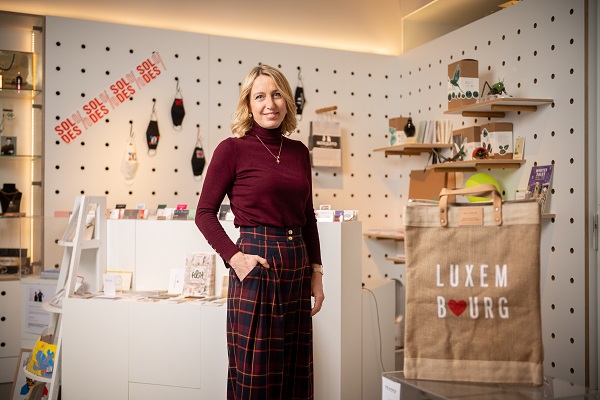 Anne Darin, Director of UCVL;
Credit: Marie De Decker
Anne Darin, Director of UCVL;
Credit: Marie De Decker
Chronicle.lu recently got the opportunity to speak with Anne Darin, Director of the Luxembourg City commercial trade union, the UCVL (Union commerciale de la Ville de Luxembourg), about this year’s January sales and, more generally, the impact of the COVID-19 pandemic on the retail industry in Luxembourg’s capital.
There are two main sales periods for the Luxembourg retail sector: one in winter and another in summer. This year, the winter sales took place from 3 to 29 January 2022; in 2021, the sales began two weeks later than usual, and continued into mid-February, due to the COVID-19 pandemic. The 2022 summer sales are set to run from 24 June to 23 July inclusive.
Chronicle.lu: The COVID-19 pandemic hit many sectors hard: how badly did it hit "non-essential" shops in Luxembourg City?
Anne Darin: During the pandemic period, with teleworking becoming increasingly widespread, the flow [of customers] has changed in the different commercial areas of the city.
Customers now come more on weekends. This of course had an impact on turnover. Some so-called non-essential sectors are more affected than others. The clothing sector is struggling while home furnishings, decoration, health and beauty are doing well.
We have seen customer habits change; they favour homewear, home delivery of meals, holidays. Businesses are gradually adapting to these new trends.
Chronicle.lu: Did many of your members have to let staff go or could they continue without making redundancies?
Anne Darin: It is certain that there is a certain correlation between the turnover and the sales force. Some businesses that have had to reduce their activity have reduced their workforce in parallel. Due to COVID-19, many people have been or are currently on sick leave, hence the need to reorganise team schedules or even the schedules of certain businesses.
Chronicle.lu: Did the government financial support schemes adequately / sufficiently help your members?
Anne Darin: Since the start of the crisis, the government has put in place significant aid measures which were essential to avoid bankruptcies and get through this unprecedented crisis. Evidently there are aways improvements to be made, such as support for the self-employed, the criteria for access to certain aid, etc. Aid must absolutely be maintained as long as the situation does not improve so as not to destroy the economic fabric.
Chronicle.lu: What can you tell us regarding rent reductions offered by landlords (e.g. the Ville de Luxembourg) to UCVL members since the start of the pandemic?
Anne Darin: Long before COVID-19, the UCVL worked a lot on commercial lease legislation by advising the public authorities on a better balance between lessor and lessee. We make landlords aware of reducing their rents when they are too high in relation to the current profitability of physical points of sale.
Online sales have been a game-changer and owners need to integrate this.
The UCVL wants merchants and landlords to start a dialogue and mutual understanding in order to find the best solutions for the maintenance and sustainability of local businesses in the city centre, the capital and more broadly the country.
In this way, the free [rent] or reductions made during the pandemic by cities or private owners have constituted very good practices for maintaining the local commercial fabric.
Chronicle.lu: Can you please tell us about the number of your members who have stopped trading (either not renewed their lease or been declared bankrupt)?
Anne Darin: We noted a few more store closures in 2020 but not necessarily bankruptcies (retirement of traders, strategies of international brands to reduce the number of sales points). But we also supported new merchants in 2021 who were setting up shop.
Chronicle.lu: Have this year’s January sales helped your members to recover some lost turnover from the last two years?
Anne Darin: The sales do not serve to recover losses, but to have cash flow, which is very important during a complicated year like the one we are currently experiencing. The results of the sales this year are not very good. The weather, teleworking, the number of COVID-19 cases are factors which have affected the sales.
Chronicle.lu: Have some members addressed the challenges of seasonal collections, i.e. when the first lockdown occurred it was mid-March when spring collections were in the shops and summer collections had been ordered?
Anne Darin: The retail trade has experienced delivery delays during the pandemic, but this is less noticeable than in the wholesale or materials trades. The delays mainly concerned goods coming from Asia, in contrast with those from Europe or the Maghreb.
Suppliers were also more flexible with regard to businesses and allowed them to adapt their orders. We have now returned more or less to normal.








